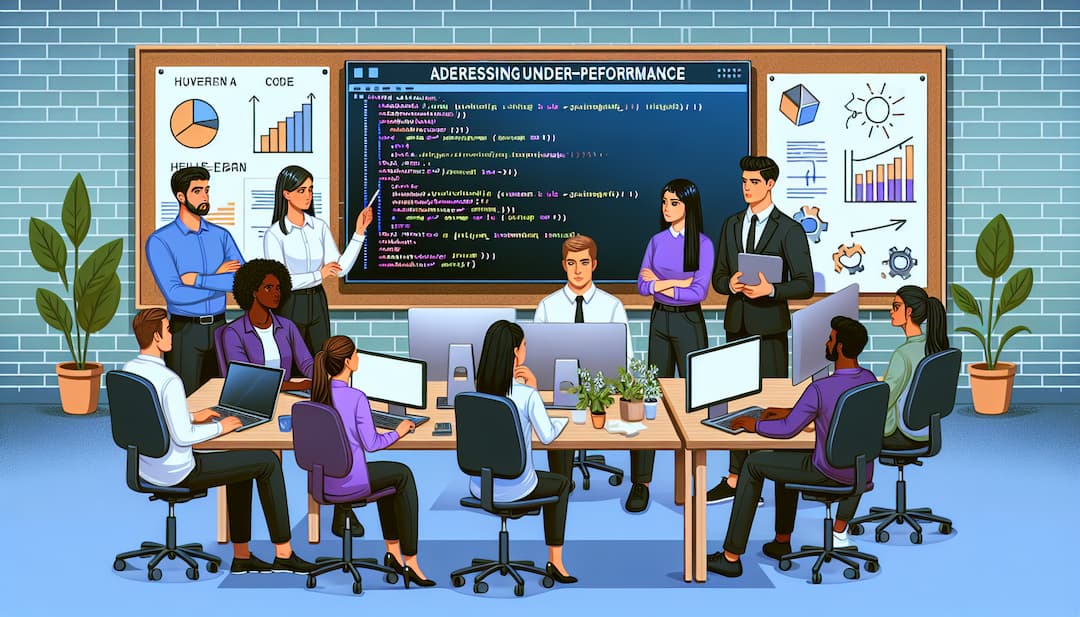Addressing Underperformance in Software Engineers
Understanding the Roots of Underperformance
Before addressing underperformance in software engineers, it's crucial to understand its underlying causes. Underperformance can stem from a variety of sources, ranging from personal issues, like health or family problems, to professional challenges, such as unclear expectations or inadequate resources. Sometimes, the fast-paced nature of the technology sector can lead to burnout or disengagement. Recognizing these factors is the first step toward finding solutions that foster a more productive and positive work environment.
Setting Clear Expectations and Goals
One common cause of underperformance is the lack of clear expectations. Software engineers need to understand what is expected of them in terms of code quality, deliverable timelines, and collaborative practices. Setting SMART goals—Specific, Measurable, Achievable, Relevant, and Time-bound—can provide a framework that helps engineers understand what success looks like. Regularly revisiting and adjusting these goals together with the engineer can ensure they remain aligned with the team's objectives and the individual's career aspirations.
Providing Constructive Feedback and Support
Feedback is essential for growth, yet it should be delivered thoughtfully. Constructive feedback helps software engineers identify areas for improvement without demotivating them. It’s important to frame feedback around specific instances and suggest actionable steps for improvement. Moreover, offering support, such as access to training or mentorship, can help struggling engineers develop the requisite skills and confidence to perform better.
Cultivating a Supportive Work Environment
The environment in which software engineers work can significantly impact their performance. A supportive and collaborative workplace encourages sharing of knowledge and cooperation, which can help underperforming engineers learn from their peers. In contrast, a competitive environment can foster fear of failure and discourage asking for help. Creating a culture that emphasizes teamwork, learning, and an open-door policy for discussing challenges can contribute to improving overall performance.
Encouraging Work-Life Balance
Software engineering can often involve long hours and high pressure to meet deadlines, which can lead to burnout if not managed properly. Organizations have a responsibility to encourage a healthy work-life balance. This could involve assigning realistic workloads, respecting personal time, and potentially offering flexible working conditions. When engineers have time to recharge, they can approach their work with renewed energy and focus.
Implementing Tailored Improvement Plans
When a software engineer is underperforming, a one-size-fits-all approach is seldom effective. An individualized improvement plan, developed in collaboration with the engineer, can address specific challenges they face. This might include setting up regular check-ins, adjusting responsibilities, or pairing them with a more experienced mentor. By creating a personalized strategy, the engineer feels invested in their own improvement and more motivated to change.
Leveraging Technology for Better Performance Management
Technology itself can be a powerful tool in managing and addressing underperformance. Through project management software, performance tracking tools, and collaborative platforms, team leads can maintain clear communication, monitor progress, and identify potential issues early. Tools that automate menial tasks can also free up software engineers to focus on more complex issues, enhancing productivity and job satisfaction.
Learning from Failure
It's important to acknowledge that failure can be a powerful learning tool. Encouraging a mindset that views setbacks as opportunities for growth rather than as purely negative events can transform the approach to underperformance. By analyzing what went wrong and exploring how to prevent similar issues in the future, software engineers can turn underperformance into an educational experience that fosters personal and professional development.
Addressing underperformance in software engineers requires a multifaceted approach, including understanding the reasons behind it, setting appropriate expectations, providing feedback and support, and creating a conducive work environment. By implementing these strategies, organizations can not only enhance performance but also promote a culture of continuous learning and improvement.





